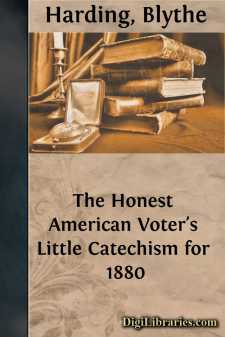Categories
- Antiques & Collectibles 13
- Architecture 36
- Art 48
- Bibles 22
- Biography & Autobiography 813
- Body, Mind & Spirit 142
- Business & Economics 28
- Children's Books 17
- Children's Fiction 14
- Computers 4
- Cooking 94
- Crafts & Hobbies 4
- Drama 346
- Education 46
- Family & Relationships 57
- Fiction 11829
- Games 19
- Gardening 17
- Health & Fitness 34
- History 1377
- House & Home 1
- Humor 147
- Juvenile Fiction 1873
- Juvenile Nonfiction 202
- Language Arts & Disciplines 88
- Law 16
- Literary Collections 686
- Literary Criticism 179
- Mathematics 13
- Medical 41
- Music 40
- Nature 179
- Non-Classifiable 1768
- Performing Arts 7
- Periodicals 1453
- Philosophy 64
- Photography 2
- Poetry 896
- Political Science 203
- Psychology 42
- Reference 154
- Religion 513
- Science 126
- Self-Help 84
- Social Science 81
- Sports & Recreation 34
- Study Aids 3
- Technology & Engineering 59
- Transportation 23
- Travel 463
- True Crime 29
The Honest American Voter's Little Catechism for 1880
by: Blythe Harding
Categories:
Description:
Excerpt
THE DIALOGUE.
What is a republic?
—A state, or Union of states, in which the people holds supreme power.
How does the people exercise this power?
—Through men elected for this purpose.
What are these men called?
—Senators and members of Congress or Congressmen.
Is there a head or chief in a republic?
—Certainly.
What is he called?
—The President.
Must the President be elected?
—Yes, by the people.
Who declares the voice of the people in this matter?
—The electors of the different states, appointed to do it by the people.
Is it necessary that the whole people should agree on one man in order to elect him?
—No; it only needs a majority of the nation, voting through the electors.
Do the votes of the electors generally follow the voice of the people in the different states?
—They ought to follow it.
Are the electors considered bound to vote as the majority of the people in their different states direct?
—Undoubtedly they are.
Then it is fair to say that the vote of a majority of the electors show which way the majority of the people voted?
—That's a simple question. Why, of course!
What are the duties of the President?
—To mind the business of the nation, and his own, too.
Anything else?
—Isn't that enough?
Well, but what is that business?
—The business of the nation?
Yes.
—He makes treaties, weeds out old political hacks, and sends them on embassies where they cannot annoy him, and have nothing to do; appoints Judges of the Supreme Court like Joe Bradley, when he wants to play eight-to-seven, commands the army and navy, gets fifty thousand dollars a year, takes all the presents he can get, lives in the White House, and does a kind of general housekeeping business for the country.
I was not talking of Grant. Let that go. Does he do anything else?
—Yes; if he comes from Ohio, he fills nearly every place he's got to give away with lean, hungry Ohio men, so that you can get a "whiff" of that state all over Washington, and in a good many other places too, any time of the day or night.
Really I don't understand you. All our Presidents do not come from Ohio or Illinois!
—Thank God they don't.
Just tell me what the Senators have to do?
—To prevent Congressmen from making fools of themselves.
Anything else?
—Yes; to keep an eye on the "jobs" Congressmen are always trying to put through.
What are the duties of Congressmen?
—God knows! I don't think they do themselves.
What should you think?
—From the way they go on, I should say: to make a grab whenever they can.
Who is now President of the United States?
—Samuel J. Tilden.
That is a mistake. The present President of the United States is Rutherford B. Hayes.
—He is, is he? Yes, just about as much as I'm owner of Central Park, when I sit down on a bench there.
What do you mean?
—I mean to say a man can't be President of this country unless he is elected, and Hayes was never elected.
Who was elected then?
—Why, Samuel J. Tilden, to be sure!
Then how did Hayes get in?
—He had some "statesmen" working for him, who kept the right man out and pushed him in....


